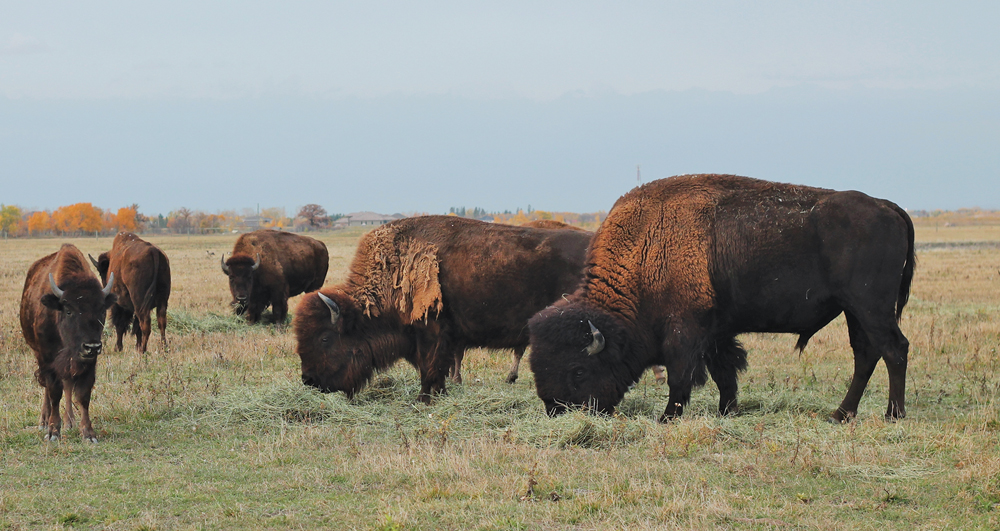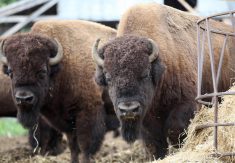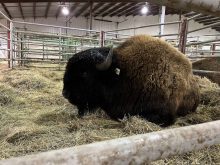The winner of this year’s Bill Lenton Memorial Award can tell a story or two about Manitoba bison.
When Ken and Sharon Johnson first introduced a handful of bison to their farm in the late ’90s, the industry was a very different place. Manitoba’s producers were just starting to organize — a national bison group had been in place since the early ’80s, but the provincial chapter only organized in 1992 — and few consumers considered adding bison to the menu.
Read Also

Researchers stay on trail of bovine bird flu’s origin
Canada’s dairy cattle herd is so far spared from avian flu, and work continues to contain its spread in the U.S., but the disease is far from gone.
The Johnsons, meanwhile, were looking for a different kind of ruminant, breaking with a decades-old tradition of raising cattle on their operation near Elkhorn.
Why it matters: The Manitoba Bison Association recognizes its most passionate advocates, and honours a pioneer of the industry, every year with the annual award.
They wanted to keep grazing animals on the landscape, valuing the contribution to environment and landscape, Ken Johnson said, but the family was also weary of the big-business-oriented cattle market.
That weariness made the small, niche bison market attractive to the couple, and in 1997, they purchased a small number of bison from a sale in Virden, selling off the last of their cattle soon after.
“It was actually my sons who were quite instrumental in making that first step, really, because they were determined that that’s what they wanted to do, so I agreed,” Ken Johnson said.
Today, that handful of animals has increased to a herd 360 cows strong.
Manitoba shed over 345,000 acres of tame and natural pasture between 2011 and 2016, according to the last Census of Agriculture, but the Johnsons are bucking that trend. The couple has returned some of their cropped land back to pasture to support their bison herd, Ken Johnson said.
Taken by surprise
The award came as a bit of a shock to the couple when their name was called at this year’s Great Spirit Show and Sale in Brandon at the end of March.
The Manitoba Bison Association hands out the award every year in memory of Bill Lenton, one of the sector’s pioneers. Both the Manitoba Bison Association and Canadian Bison Association count Lenton as a driving force in their creation, and he is credited for his efforts to get bison certified for export.
Award winners, likewise, have shown their dedication and support for the industry and have put time into promoting the sector.
“It’s quite an honour to be recognized by your peers,” Ken Johnson said. “There’s lots of us who have been pretty supportive and passionate about this business and the association that helps us, or that we use to get information out about the industry and make sure we’re all thinking in the same direction.”
A long-standing association member, Ken Johnson has taken a seat on the association’s board in the past, including a two-year stint as the Manitoba representative at the Canadian Bison Association.
“Our very first show and sale that we had 20-some years ago, they bought animals there,” Robert Johnson, Manitoba Bison Association president, said. “They can remember all the way back and they’ve been really strong supporters of our industry, through the good years, and then the really, really lean years.”
The lean years he refers to are the BSE crisis in 2003, which hit the bison industry as hard or harder than the beef sector. The U.S. is the largest market for local bison producers and connected to the Manitoba sector through the North American Bison Co-op. That group operated a processing facility at New Rockford, N.D. When the border was suddenly closed, prices plummeted.
“Our market was put on hold,” Ken Johnson said. “It was a very traumatic time, you might say. We had to now find other markets and try to sell our bison more locally or through Canadian markets that weren’t very numerous or well developed.”
In the aftermath, producers were left to scramble for a piece of that smaller Canadian market.
That was on top of frustrations that the co-op was having trouble moving the meat, creating backlog and delayed payments.
In 2002, a Canadian Crown corporation filed a U.S. lawsuit against the co-op, claiming it had failed to pay four ranchers that the corporation insured.
The last six to eight years, however, have seen a more positive turn to the market. Prices have rebounded since BSE, Robert Johnson said, and bison has made headway on consumer demand. The lower Canadian dollar, likewise, has been a boon for bison producers, along with many other Canadian agricultural commodities that rely on export
Bison has a higher profile than when he first brought his bison home, Ken Johnson said, something he directly credits to industry promotion.
“It’s really come a long ways, the availability of it and the demand for it, which certainly helps,” he said.
The couple is now in the process of handing over the torch to the next generation, and their son, Rodney, has followed his father’s footsteps, taking a place on the Manitoba Bison Association board this year.
“Things are kind of coming around full circle for them right now and we figured with a prestigious award like this, it’s really good timing to give them the recognition that they deserve,” Robert Johnson said.
















